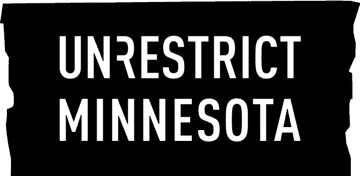As a community-supported public awareness campaign, UnRestrict Minnesota is driven by the solidarity and leadership of its community partners. Together, these advocates, health care providers, lawyers, union members, artists, and concerned citizens are advancing every Minnesotan’s right to access abortion care in our state.
Jewish Community Action (JCA) is the Jewish voice in Minnesota’s movement for economic, racial and social justice. Organizing in solidarity with other marginalized communities in Minnesota through state and local coalitions, interfaith initiatives, and local neighborhood groups, JCA’s relationships drive their community’s investment in and accountability to each other. Through their work, JCA honors their history and ancestors.
Q&A
In this conversation, JCA Executive Director Beth Gendler shares more about the organization’s deep roots in Minnesota, the importance of reproductive freedom to Jewish values, and the essential practice of solidarity in building more just futures, in our state and beyond.
Could you tell us a little bit about your organization and its work?
Jewish Community Action has been around since 1995, when it was founded by State Representative Frank Hornstein in collaboration with a group of other Jewish community leaders. This work started because there wasn’t a space in Minnesota for the Jewish community to come together around local, progressive policy issues that affect all of us here at home. Since 1995, JCA has grown and expanded, though our central mission remains the same—to organize the Minnesota Jewish community around racial and economic justice.
We have four primary campaign areas: housing justice; decriminalizing communities, which works at the intersection of the criminal justice and immigration systems; our Combating Hate initiative, which is working to update Minnesota’s hate crimes law and address antisemitism and white nationalism in the context of intersecting oppressions; and recently we’ve added a fourth campaign area around creating a multi-faith and multiracial democracy, and weaving those issues of democracy through all our other campaign areas.
We joined the UnRestrict Minnesota coalition because reproductive justice is essential to our Jewish values and to this work. We know that reproductive freedom impacts housing justice. We know that people need safe homes to be able to raise their kids, should they choose to have them. We know that decisions about abortion access and access to health care deeply impact our criminal justice system and our immigration system. We know that we can’t talk about combating hate or achieving gender equity without also talking about abortion access. This work is absolutely intersectional and absolutely intertwined.
Why is this work important to take on in Minnesota?
Our work at JCA is very local because that’s where we know we can make a difference. It has always been done at the local level. For example, in our work around housing justice, the work that we do is in municipalities, it’s in communities, it’s in individual apartment buildings, it’s with tenant coalitions. We believe in organizing where we can make real change—where we work, where we live, where we learn, where we play. That is why it’s so important for us to be a Minnesota organization.
Why did you join the UnRestrict Minnesota coalition?
I came to JCA from the National Council of Jewish Women, where working on reproductive freedom has been a key issue since that organization’s inception 130 years ago. And what I learned when I was at NCJW and what I heard as soon as I started at JCA from JCA members is that the Jewish community cares deeply about protecting reproductive freedom. And it was also important for us to join in our identity as a faith-based organization. The faith perspective has really been co-opted by the anti-abortion movement, and as a faith-based organization, we need to be loud and proud that there are people of deep faith and deep morals and deep ethics who also care deeply about reproductive freedom.
We have been—and I count in myself in this group too—so conditioned by Christian hegemony in this country that it has impacted our own thoughts and feelings in the way we talk about and think about abortion. But the right to abortion is an important part of Jewish faith, Jewish tradition, and Jewish Torah. When you talk to rabbis and scholars from across the spectrum of observance, you will hear that abortion care should be protected. It’s a medical procedure to be decided with your doctor, with your family, with yourself. It is not a political decision and it’s not a religious decision; it’s a personal decision, and it has to do with our notion of when life begins. And the fact that in this country, the discourse is rooted in a really Christian notion of when life begins—it’s antithetical to our constitutional rights, and our right to religious freedom.
In this conversation, it’s also important to recognize that the stance on abortion is so clear in Judaism that it can be painful for folks who experience pregnancy loss, miscarriage or stillbirth, because there isn’t a ritual in Judaism to support that kind of loss. I can’t speak to how important religious freedom is to Judaism without acknowledging that pain. Some of our clergy have created some rituals to support families and folks who lose pregnancies and go through that, but it’s a new part of our theology that’s important to acknowledge.
What does achieving full reproductive justice in Minnesota mean to you?
Reproductive justice is justice. It’s being able to live in healthy, safe communities; to have children or not have children; to bring them into a safe, supported world that represents all of us. We know that all of the systems that we’re working within in Minnesota and in our country are flawed. They were built from racist structures. And so even while we’re working to ensure that the criminal justice system, the immigration, and asylum system work as well as they can for people, we understand that those systems themselves are faulty.
And this is across all of our work: it’s across housing, across policing, across democracy. We know that we need to make these systems work as well as they can while we have them, and we also know that they need to be dismantled. Our work is two-fold: we have to make sure that people have access to the systems that exist while we work to create systems that are truly meaningful. So what reproductive justice looks like is justice. It’s systems that are built by and for and with everybody in Minnesota. It’s building power in solidarity with other communities, and centering the voices and perspectives of those who have been most impacted by harm.
How can people get engaged with your work?
The easiest way is to visit our website! You can join us as a member, sign up for our emails, follow us on social media, or attend our events. We try to do a public Antisemitism and White Nationalism 101 training every couple months, which can be a way to get immersed in our anti-hate work, and our annual Freedom Seder is a great opportunity to connect with our community and the full spectrum of our work. Join one of our advocacy teams, or join one of our housing teams if you happen to live in one of the Hennepin County suburbs, to meet your neighbors and work alongside them towards housing justice.


